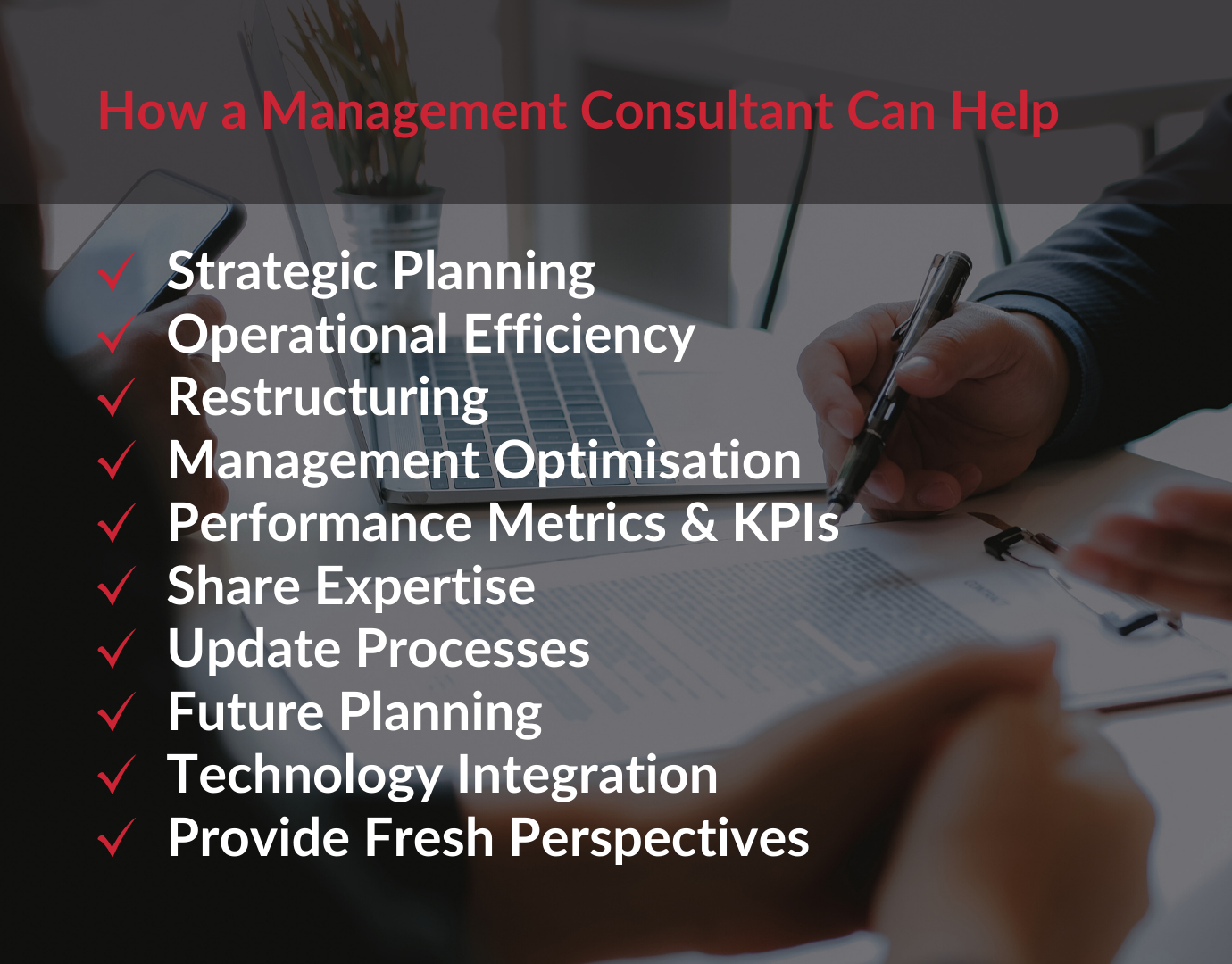
10 Practical Ways a Business Management Consultant Can Help
10 Practical Ways a Business Management Consultant Can Help

If you’re hesitant to bring on an external management consultant, you’re not alone — after all, what would an outsider know about your business that you don’t? But this “outsiderness” is exactly what makes a business management consultant valuable. They can see straight to the heart of a business and identify inefficiencies, redundancies and, most importantly, opportunities that would otherwise be missed.
In this blog, we’ll explore the practical ways a management consultant can take your business to the next level.
What is a business management consultant?
A business management consultant is a professional hired to provide expert advice and assistance to organisations to improve their business performance. These consultants work closely with the management team and stakeholders to analyse existing business processes, identify areas for improvement, and recommend strategic solutions.
Their expertise spans various aspects of business operations, including organisational structure, efficiency, workflow, technology, and overall strategic planning. Business management consultants often bring industry knowledge, best practices, and a fresh perspective to help companies overcome challenges, optimise performance, and achieve their business goals. Depending on the organisation’s specific needs, they may be engaged on a project basis or as ongoing advisors.
What do business management consultants do?
Consulting firms offer a range of services and can help to fill operational gaps or deliver strategic direction. A business management consultant’s role is to provide an expert, outsider assessment of a business and identify areas for improvement in its current management practices.
Here are the main duties of a business management consultant.
- Obtain a thorough understanding of their client’s businesses through client interviews and collecting, collating and analysing data.
- Use financial modelling, ongoing industry research and trends and industry literature to make expert recommendations.
- Provide staff and management performance appraisals and feedback
- Develop policies, procedures, business proposals and other high-stakes documentation
- Develop and implement business strategies
- Provide practical process improvement recommendations
- Provide consultation on sustainability, health and safety, IT security and quality control
A business management consultant will tailor their services to your needs and can provide anything from a one-off audit and consultation to a full-scale overhaul of your business.
When should I hire a business management consultant?
Hiring business consultants can be one of the smartest decisions you can make. Here are some common reasons people hire business management consultants.
- Your business growth has plateaued, and you’re not sure what to do next
- Your business has rapidly expanded, and you need to restructure to keep up
- You’re lacking inspiration
- You’re consistently falling short of your goals and KPIs
- You’re struggling to keep up with current technology or business trends
10 practical ways a business management consultant can help
Management consultancy is an opportunity to find new ways to grow your business. From strategic advice on business structure and business administration to risk management and business processes, a consultant can help you improve efficiency and reach your goals. Here are five practical ways a business management consultant can help you improve your business.
#1. Provide Strategic Planning
A business management consultant is pivotal in shaping and fine-tuning an organisation’s strategic plan. They contribute by conducting thorough market analysis and competitor research, providing crucial insights to inform strategic decision-making. Through this process, consultants help identify growth opportunities and potential threats, establishing a robust strategic foundation for the organisation.
This could include:
- SWOT Analysis: Conduct a thorough analysis of the organisation’s strengths, weaknesses, opportunities, and threats.
- Market Research: Gather data on market trends, customer preferences, and competitive landscape.
- Strategic Workshops: Facilitate workshops with key stakeholders to collaboratively define and refine the organisation’s strategic objectives.
#2. Improve Operational Efficiency
The business management consultant engages in a comprehensive analysis of current business processes, aiming to pinpoint inefficiencies and bottlenecks within the operational framework. Following this evaluation, the consultant recommends and actively implements process improvements to elevate overall operational efficiency. By introducing best practices and establishing streamlined workflows, the consultant optimises resource utilisation, contributing to a more effective and efficient organisational structure.
This could include:
- Process Mapping: Document and analyse existing business processes to identify areas for improvement.
- Lean Six Sigma Principles: Apply principles of Lean and Six Sigma to eliminate waste and improve process efficiency.
- Benchmarking: Compare the organisation’s processes with industry best practices to identify opportunities for optimisation.
#3. Advise on Organisational Restructuring
The business management consultant thoroughly assesses the existing organisational structure, providing recommendations for enhancements to bolster overall effectiveness. This involves guiding the process of team restructuring, refining role definitions, and establishing clear reporting lines. Additionally, the consultant plays a key role in implementing these recommended changes, fostering improved collaboration and communication within the organisation.
This could include:
- Organisational Audits: Assess the current organisational structure, roles, and responsibilities.
- Change Impact Analysis: Evaluate the potential impact of restructuring on employees and stakeholders.
- Implementation Planning: Develop a phased plan for organisational restructuring with clear communication strategies.

#4. Help Optimise Management
The business management consultant evaluates the current organisational landscape and supports the organisation in effectively managing and navigating through periods of change. In this capacity, the consultant develops comprehensive change management strategies, aiming to facilitate smooth transitions during periods of organisational transformation. Furthermore, the consultant actively provides training and resources, equipping employees with the necessary tools to adapt seamlessly to new processes and systems.
This could include:
- Stakeholder Analysis: Identify and analyse the individuals and groups affected by the change.
- Communication Plans: Develop communication strategies to keep stakeholders informed throughout the change process.
- Training Programs: Design and implement training programs to equip employees with the skills needed for the changes.
#5. Facilitate Technology Integrations
The business management consultant conducts a thorough evaluation of the current technology infrastructure, identifying potential opportunities for upgrades or new implementations. Building on this assessment, the consultant recommends and oversees the integration of technological solutions aimed at enhancing overall efficiency and productivity within the organisation. Furthermore, the consultant plays a key role in guiding digital transformation strategies that align closely with the overarching business objectives, ensuring a cohesive and strategic approach to technological advancements.
This could include:
- Technology Audits: Evaluate the existing technology infrastructure and systems.
- Vendor Selection: Assist in selecting suitable technology vendors and solutions.
- Implementation Oversight: Provide guidance during the implementation of new technologies, ensuring a smooth integration process.
#6. Develop Performance Metrics and KPIs
The business management consultant defines key performance indicators (KPIs) designed to measure the success of diverse business functions. This involves establishing precise metrics for monitoring progress towards strategic goals, and providing a comprehensive framework for evaluating organisational performance. Additionally, the consultant implements systems dedicated to tracking and analysing performance data, enabling informed decision-making based on a thorough understanding of key metrics and benchmarks.
This could include:
- Key Performance Indicator (KPI) Definition: Collaborate with stakeholders to define relevant KPIs aligned with strategic goals.
- Dashboard Development: Design dashboards and reporting systems to track and visualise performance metrics.
- Continuous Monitoring: Establish processes for continuous monitoring and adjustment of performance metrics based on organisational needs.

#7. Provide a Fresh Perspective and Holistic View of Your Business
When immersed in the everyday running of your business, it can be hard to identify important improvement opportunities. Even if you’re surrounded by dedicated, knowledgeable staff, when you’re too close to the project, it’s almost impossible to identify shortcomings, roadblocks and areas for improvement. Bringing in a management consultant solves this issue.
This could include:
- Assessments: Business management consultants offer unbiased assessments and objective recommendations for business improvement. This approach helps identify improvement opportunities that might not have been previously recognised.
- Holistic Business Recommendations: Rather than addressing issues reactively or making ad hoc improvements, this process provides a holistic view of the improvements required to elevate your business to the next level.
It’s always beneficial to know what competitors in your industry are doing. Are your processes in line with best practices? Is there a new piece of technology, a new way of doing business or a fresh management approach that could benefit your team? If so, a business management consultant can advise you on the best practices used by competitors and, in doing so, strengthen your current procedures.
This could include:
- Industry Insights: Leveraging cross-industry experience to offer well-informed advice to your business.
- Practical Advice: Integrating practical observations with business theory and best practices to deliver training and advanced problem-solving solutions for your team.
- Identifying Business Challenges: Utilising extensive experience to identify core challenges within your business.

#9. Update Processes
When you’re immersed in your day-to-day operations it can be hard to see the forest from the trees. Consultants are trained to identify roadblocks, inefficiencies and outdated processes and provide business owners with solutions.
A business management consultant will shadow workers and examine existing processes to assess your current operations. They’ll then identify areas for improvement and either optimise the existing processes or develop new ones where no process currently exists. They’ll then help you implement the process through training and the development of guidelines, instructions and other process documents.
For example, a business may not have a contact management process. The consultant can assess the business’s contract management needs, develop a process and create a roadmap for implementing the new process.
This could include:
- Operational Insights: Identifying opportunities to streamline operations and enhance efficiency that may otherwise go unnoticed.
- Cross-functional advice: Contributes to boosting business profitability, safety measures, staff retention, and other critical factors, depending on the processes addressed.
- Goal-Based Improvements: Optimising processes to positively impact key performance indicators and overall business success.

#10. Assist with Future Planning
It’s crucial to be as intentional as possible with your business growth. Without a goal, steps and roadmap you’re unlikely to achieve the business growth you want to see. A management consultant can help you scale your business, adapt to changing industry trends and plan for the future.
This could include:
- Goal Setting: Assisting in mapping out clear business goals, alleviating the challenge of precisely defining the business’s direction.
- Identifying and Prioritising Business improvements: Providing practical steps and advice on various aspects such as financial planning, marketing, staffing needs, ISO certifications, and more to facilitate goal-setting.
- Assisting with Business Growth: Accelerating the pace of business growth efforts by leveraging the consultant’s expertise, ensuring a more impactful and directed approach.

Business Management Consulting with BusinessBasics
Our consultants have extensive experience in various industries including mining, construction, civil construction, distribution and logistics, manufacturing, retailing, wholesaling, and allied health services. As a result, our consultants can provide expert opinions and essential context no matter your business’s industry.
These are just some of the ways that we can help your business:
- Business performance consulting
- Employee performance
- Management performance
- Business turnaround
- Quality, Safety and Environmental consulting
- Sustainability consulting
- Policy and procedure development
- Process improvement programs and audits
- Planning and strategy development






